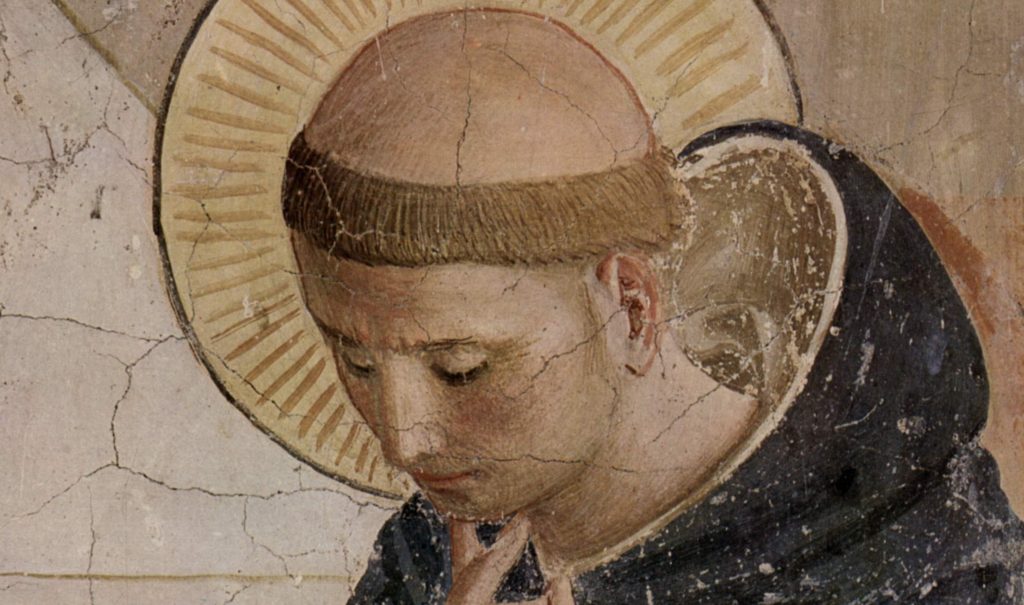Often when we hear the word “meditation,” we think of a Buddhist monk sitting on the floor, eyes closes, and emptying his mind from everything so that he literally thinks about nothing. That is why many people balk at the idea of meditating on God’s Word, either not knowing what to do or being intimidated by it.
[featured-image single_newwindow=”false”]
Thankfully, Christian meditation is not something reserved for the “enlightened,” but is a simple practice that is perfected over time. It is not about “emptying” yourself from all of your thoughts, but focuses on immersing yourself into scripture and reflecting on the scene, embracing all of your senses.
The Catechism of the Catholic Church explains meditation in this way:
2705 Meditation is above all a quest. The mind seeks to understand the why and how of the Christian life, in order to adhere and respond to what the Lord is asking.
2706 To meditate on what we read helps us to make it our own by confronting it with ourselves. Here, another book is opened: the book of life. We pass from thoughts to reality. To the extent that we are humble and faithful, we discover in meditation the movements that stir the heart and we are able to discern them. It is a question of acting truthfully in order to come into the light: “Lord, what do you want me to do?”
2707 There are as many and varied methods of meditation as there are spiritual masters. Christians owe it to themselves to develop the desire to meditate regularly, lest they come to resemble the three first kinds of soil in the parable of the sower. But a method is only a guide; the important thing is to advance, with the Holy Spirit, along the one way of prayer: Christ Jesus.
2708 Meditation engages thought, imagination, emotion, and desire. This mobilization of faculties is necessary in order to deepen our convictions of faith, prompt the conversion of our heart, and strengthen our will to follow Christ. Christian prayer tries above all to meditate on the mysteries of Christ, as in lectio divina or the rosary. This form of prayerful reflection is of great value, but Christian prayer should go further: to the knowledge of the love of the Lord Jesus, to union with him. (emphasis added)
Let us return to our passage from last week and practice the art of meditation:
And he said to his disciples, “Therefore I tell you, do not be anxious about your life, what you shall eat, nor about your body, what you shall put on. For life is more than food, and the body more than clothing. Consider the ravens: they neither sow nor reap, they have neither storehouse nor barn, and yet God feeds them. Of how much more value are you than the birds! And which of you by being anxious can add a cubit to his span of life? If then you are not able to do as small a thing as that, why are you anxious about the rest? Consider the lilies, how they grow; they neither toil nor spin; yet I tell you, even Solomon in all his glory was not arrayed like one of these. But if God so clothes the grass which is alive in the field today and tomorrow is thrown into the oven, how much more will he clothe you, O men of little faith! And do not seek what you are to eat and what you are to drink, nor be of anxious mind. For all the nations of the world seek these things; and your Father knows that you need them. Instead, seek his kingdom, and these things shall be yours as well.
“Fear not, little flock, for it is your Father’s good pleasure to give you the kingdom.” Luke 12:22-32 (RSV-CE)
First of all, imagine the scene. What do you see? Place yourself among the twelve disciples. How are they reacting to Jesus’ teaching? What do their faces tell you?
Now look at Jesus as He speaks these words. What is His manner of speech? Look at His eyes. What do they tell you about these words?
Now enter into Jesus’ words. Imagine the ravens and birds and how they go about searching for food, always finding it. Now imagine the lilies and grass and how they simple stay there in the field and are nourished by the rain and sun.
Now place yourself into Jesus’ little flock. Do you have any fear? Do you see how the Good Shepherd is always watching over you?
Of all the images in this brief passage, which ones stand out for you? Why do you think so?
When Jesus says, “O men of little faith,” picture yourself along with the disciples, hearing those words directed at you in particular. Do they hurt a little? What do you feel?
Take a few moments to ask God what He is trying to tell you through these words. What is it that you worry about? Bring everything to Jesus.
After meditating on this brief passage, we are now led into oratio or prayer. Next week, we will examine this part of lectio divina and explore what it is that we should pray for.
Read the Entire Series:
- The First Step of Lectio Divina: Slow Down!
- What is Lectio Divina and Why Bother?
- Breathe Life into the Divine Office with C.S. Lewis’ Reflections on the Psalms
- An Introduction to the Four Volume Breviary
- Beginner’s Guide to Praying the Liturgy of the Hours
- Physical Breviary vs. iBreviary: How is a Person to Pray?
- The Digital Breviary: A Guide to Praying the Divine Office in a Digital World
- 5 Reasons to Pray the Divine Office Daily
- 5 Practical Ways to Prepare for Mass
- How to Actively Participate in Mass
- 3 Ways to Imitate Jesus’ Vocal Prayer
- How to Pray Like Jesus: The Ultimate Checklist

